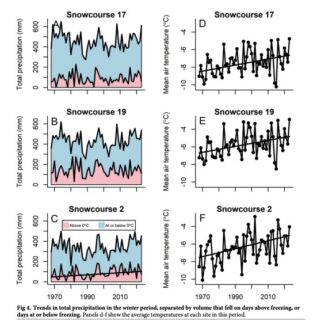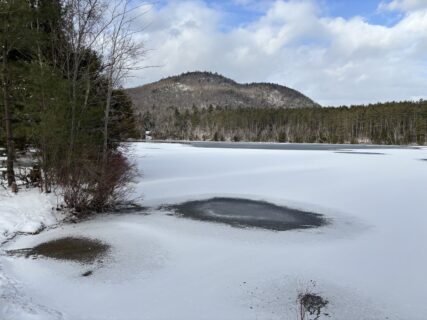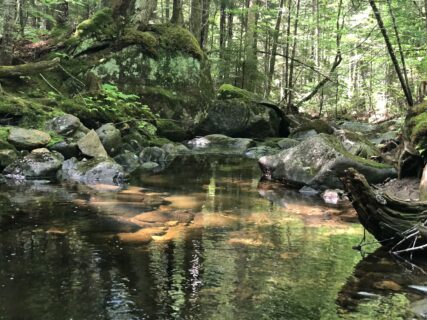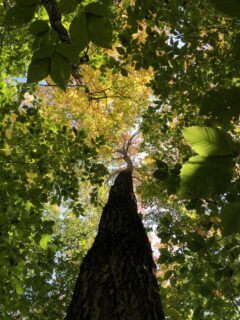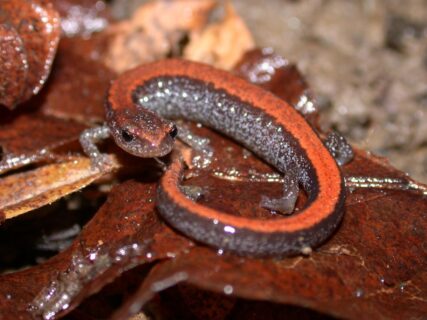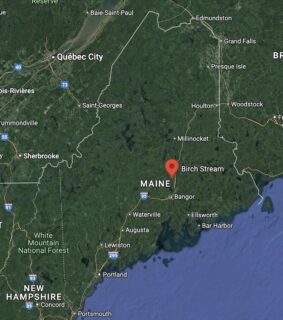Seasonal snow cover is important for the health of Northeastern forest ecosystems, influencing everything from soil temperatures and nutrient cycling to groundwater recharge and wildlife habitat. A newly published paper reports that warming winter temperatures and shifting precipitation patterns may be altering these once predictable snowpack dynamics. “Long-term measurements of…
“The official Ice-in date for Mirror Lake is December 7th,” Tammy Wooster from the Cary Institute for Ecosystem Studies reports. “I was waiting to share thinking the recent rain might cause it to break up, but it seems locked in for the winter!” This year’s Ice-in date is part of…
Once upon a time… The early morning light filtered through the canopy of sugar maples and yellow birch, dappling the forest floor with soft golden patches. John Morgan stepped over a mossy log and paused, listening for the faint trickle of water. He was deep in the Hubbard Brook Experimental…
In the forests of New Hampshire, climate change is shifting the seasons in subtle yet profound ways. Winter is warming faster than any other season across northern latitudes, accelerating snowmelt and vegetation green-up. However, the rate of change is uneven, resulting in a longer transitional period between snowmelt and full…
Snow, a defining feature of New England winters, is as complex as it is fleeting. Its distribution and behavior—how much falls, where it accumulates, and when it melts—are shaped by a web of factors ranging from topography to vegetation. But these patterns are changing, and so are the tools used…
At the American Geophysical Union’s 2024 Fall Meeting, researchers including University of New Hampshire-based Hubbard Brook Research Foundation trustee Alix Contosta will present “The Northeast Snow Survey (NESS) Feasibility Study,” highlighting shifts in winter conditions in the northeastern United States. Winter is warming faster than any other season east of…
Soil respiration plays a crucial role in regulating the release of carbon dioxide (CO2) from soils into the atmosphere. This is particularly important in temperate broadleaf forests like Hubbard Brook, where about 70% of ecosystem respiration comes from soil. Understanding how nutrient availability, particularly nitrogen (N) and phosphorus (P), affects…
A new study, “Range-wide salamander densities reveal a key component of terrestrial vertebrate biomass in eastern North American forests”, (paywall) published in the August 2024 issue of Biology Letters describes the significant ecological role of the eastern red-backed salamander (Plethodon cinereus) in forests across eastern North America. For findings reported…
Written and animated by Hubbard Brook Research Foundation’s Raisa Kochmaruk. Inspired by a Xavier Cortada DO NOT OPEN workshop held in the Hubbard Brook Experimental Forest this summer. Cortada about DO NOT OPEN: “In “DO NOT OPEN,” I ask residents to write letters to the future. I do so because…
The Penobscot Indian Nation Department of Natural Resources (PIN DNR) has received funding to replace two bridges on the Birch Stream Road in Maine with larger structures. The goal is to improve fish passage and better manage high flow events, addressing the challenges of climate change, and to find out…

